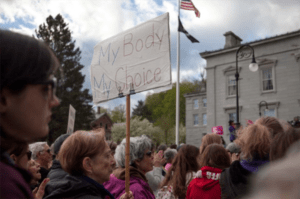By Grace Benninghoff/VTDigger
Vermont lawmakers who support abortion rights say it’s more important than ever to enshrine such rights into the Vermont Constitution following a U.S. Supreme Court ruling this week that upheld new restrictions in Texas.

Abortion-rights advocates rallied at the Statehouse to protest abortion restrictions in other states in May 2019.
Proposal 5, also known as the Reproductive Liberty Amendment, would solidify abortion rights in Vermont’s state constitution. The measure has been moving through the long process of passage for more than two years.
“This is really compelling us to make it happen,” Sen. Ginny Lyons, D-Chittenden, said of the Supreme Court’s decision.
In a 5-4 vote announced Wednesday night, the country’s highest court denied a request to overturn a law in Texas that severely limits abortion access, prohibiting abortions after about six weeks of pregnancy — before many women realize they are pregnant.
The law allows private citizens to bring civil suits against anyone who helps a pregnant person seeking an abortion, including physicians, nurses, friends and even Uber drivers who provide a ride to an abortion clinic. The law provides no exceptions for cases of rape or incest.
The decision was celebrated by anti-abortion activists, while those who support abortion rights considered it a devastating blow to their movement.
Now, Vermont leaders are feeling more pressure than ever to formally protect reproductive rights via constitutional amendment so that they cannot be easily overturned.
Sen. Ruth Hardy, D-Addison, said the decision in Texas adds “even more urgency” to the Proposal 5 movement. Republican Gov. Phil Scott, who previously expressed support for the amendment, did so again this week.
Scott spokesperson Jason Maulucci said if the governor “were still a member of the State Senate, he would have voted in favor of Proposal 5 and hopes the House follows the Senate’s lead when they return to session next year.”

House Speaker Jill Krowinski , D-Burlington in Feb. 2020.
Lt. Gov. Molly Gray, Senate President pro tempore Becca Balint, D-Windham, and House Speaker Jill Krowinski, D-Burlington — all Democrats — released statements Thursday decrying the Supreme Court decision.
“We are witnessing a catastrophic step backward in the fight for reproductive justice in our country,” wrote Gray, who also urged Vermonters to “remain diligent” in efforts to adopt Proposal 5.
The proposed constitutional amendment states that “the right to reproductive liberty is central to the exercise of personal autonomy and involves decisions people should be able to make free from compulsion of the State.” It would protect abortion rights by mandating access to abortion and contraception, and it would prevent forced sterilization, a practice historically supported by the eugenics movement.
The process of amending the Vermont Constitution is extensive and slow. Following initial passage by the Senate and House in 2019, Proposal 5 was again passed by a freshly elected Senate earlier this year. If it passes the House during the upcoming session slated to begin in January, it would go on the ballot in November 2022 for voters to approve.
Should the amendment pass, it would become the country’s first constitutional amendment at the state or national level specifically protecting abortion rights. Some states have found in lower courts that abortion access falls under the purview of protections such as the right to privacy, but Vermont’s push to guarantee such rights would be unprecedented.
State law already protects abortion rights in Vermont. In 2019, the Legislature passed and Scott signed into law H.57, which codified long-standing state court precedent that abortion is legal in the state.
Proposal 5 advocates have said that does not go far enough in protecting abortion rights — particularly given mounting threats in recent years to the protections afforded by Roe v. Wade, the 1973 U.S. Supreme Court decision. A slew of states, including Mississippi, Alabama, Indiana and Texas, have passed stringent anti-abortion legislation.
Abortion-rights activists often consider those laws to fly in the face of Roe and say they are an attempt to provoke new decisions on the high court, according to Lucy Leriche, a Vermont lobbyist for Planned Parenthood of Northern New England.
Activists note that the Supreme Court has taken a more conservative bent in recent years with the appointment of Justices Neil Gorsuch, Brett Kavanaugh and Amy Coney Barrett. In May, the court agreed to take up a case from Mississippi that could reverse Roe v. Wade.
“We’ve seen state after state pass unconstitutional laws, knowing that it will go to the Supreme Court, knowing that some justices are there for the sole purpose of overturning Roe v. Wade,” Leriche said.
Her organization planned a Rally for Reproductive Rights in Solidarity with Texans at 6:30 Friday evening in Burlington’s City Hall Park.
Should Roe v. Wade be overturned by the Supreme Court, issues of abortion access could be delegated to state legislatures. Some states have already enacted “trigger bans” that would automatically go into effect should Roe v. Wade fall — either completely banning or seriously limiting access to abortion. Advocates for Proposal 5 say the constitutional amendment would do the opposite.
Krowinski, who previously worked for Planned Parenthood of Northern New England, said it’s important to her to formally protect abortion access in Vermont “so that people can make that decision between their doctor, themselves, their faith and their families.”
“It shouldn’t be up to politicians,” she said.
Kalin Gregory-Davis, a medical student at the University of Vermont and the board president of Medical Students for Choice, said the situation in Texas — and the potential fragility of Roe — underscores the importance of Proposal 5 in Vermont.
“Say Roe v. Wade does get overturned, we want to make sure abortion is accessible at least somewhere,” Gregory-Davis said.
Before studying to become an abortion physician in Vermont, Gregory-Davis lived in Texas and then worked at an abortion clinic in New Mexico. After the passage of House Bill 2 in Texas, which included a requirement that abortion physicans hold hospital admitting privileges — a complicated designation that is often deemed medically unnecessary for providers — more than half of the clinics in the state closed.
Gregory-Davis said her clinic in New Mexico eventually saw more than half its patients coming from Texas due to the impact. Some traveled more than 15 hours by car to get there — but for others, the cost of gas, lodging and time off from work would be prohibitive.
Although House Bill 2 was eventually deemed unconstitutional in Texas, the law was in effect long enough to shutter more than half the state’s clinics.
In the Supreme Court’s decision released Wednesday, justices left the door open to revisiting the legislation should it come to the court through a different avenue. However, even if sometime in the future the legislation is found to be unconstitutional, it may be too late for many abortion clinics in Texas to reopen.
“Anti-abortion legislation is really contagious,” Gregory-Davis said. “You see it popping up all over in different states, and I hope that Prop 5 can be that but in the opposite direction.”
She said she believes the amendment could start a “domino effect,” in which other progressive states could follow Vermont’s lead in protecting abortion-rights in the face of serious threats to access at the federal level.
“It feels really scary as a medical student, and as someone who wants to provide abortion, that my work someday could be illegal,” Gregory-Davis said. “That is super hard.”
On the other side of the ideological divide, Mary Hahn Beerworth, executive director of the Vermont Right to Life Committee, said she is concerned that Proposal 5 includes “highly irresponsible language,” which she said would offer no protection for fetuses.
“[If] some crazy whacked-out boyfriend kicks their pregnant girlfriend in the stomach, we want him charged not just for assaulting the girlfriend but for killing the unborn child,” Beerworth said. She argued the amendment would make that impossible.
While Beerworth believes Vermont is “entirely unaffected” by what is happening at the national level and in Texas, she said her organization would be “energizing our base” ahead of the consideration of Proposal 5 in the Vermont House.
Lyons, the Chittenden County state senator, said she is concerned that Proposal 5 may bring anti-abortion activists to Vermont.
“It would be really upsetting to see millions of dollars coming from outside of our state saying things that are inappropriate and wrong, and we saw that during our testimony on the amendment,” said Lyons, who chairs the Senate Health and Welfare Committee.
Leriche said she wouldn’t be surprised by such a scenario.
Although the amendment is expected to pass, Krowinski says she is not taking anything for granted. “
The work on this is not over. … I would put everything on the table because this is so important,” she said.
And Gregory-Davis cautioned against over-confidence.
“I don’t want us to feel like this is a slam dunk,” she said.




